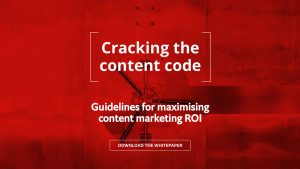
The Economist Group announced the findings from its latest global content marketing study, ‘Cracking the Content Code’. The white paper is based on analysis of The Economist Group’s own client content programmes over a 12-month period: more than 50 microsites created for brands in the US, EMEA and APAC as well as all media units across a broad range of industries, from luxury to consumer to finance.
The study reveals five key steps for creating successful content marketing programmes, contextualised through interviews with The Economist Group’s clients and commentary from industry experts. The guidelines highlight publishers’ unique role in creating contextual and value-driven campaigns, and provides brands with insights for pre-, mid- and post-campaign to maximise their marketing ROI.
1. Promotion in trusted environments performs best for engagement
The research found that content promoted on-domain (e.g. Economist.com and Economist apps), regardless of the brand on the content, received 40% higher average time spent, compared with visitors coming from off-domain or social amplifications. In a brand-safe environment where readers know they can trust the editorial content, that trust translates into strong engagement with client programmes.
2. Custom content delivers the highest engagement
This credibility carries through to bespoke content. The analysis shows that custom content created by a publisher on behalf of a brand performs better for engagement than repurposed content from a brand. Whilst distribution capabilities are important, crucially publishers can also offer unparalleled insights into their audience, and in the instance of The Economist Group, can provide a psychographic match through custom content.
3. Add paid social to achieve the content ‘sweet spot’
Engagement and reach are often considered opposing KPIs, which is a common pain point for advertisers. Compared with on-domain traffic drivers, paid social amplifications deliver higher reach but lower engagement. However, the findings reveal that the two are not mutually exclusive. Best-performing programmes which follow a media split of 50% paid social and 50% on-domain media create a content “sweet spot”, where engagement as well as awareness can be achieved. Furthermore, although brands are often attracted to publishers’ editorial social handles for organic promotion, paid social actually provides the best scale as well as targeting capabilities.
4. Interactive data tools and bespoke videos perform best
The analysis goes on to show that content programmes hosting an interactive data tool or video offer the best performance across reach and engagement. The study found a 3x higher average read time on interactive indexes, and a 41% higher average completion rate on custom videos, compared with the benchmark. Defining KPIs early in a programme is critical, and the study highlights how publisher data can help determine the right approach for success.
5. Leave room to experiment
The paper concludes that whilst data can offer insights that spark creativity, ultimately analytics can only take us so far since they assess what has gone on in the past. In an environment of content overload where the average consumer is exposed to up to 10,000 brand messages a day, creativity and risk-taking are what will make a brand stand out—but brands that want to innovate need to allow enough room in the budget to do that.
“At The Economist Group we are confident that publishers retain a unique role in content marketing, and that there is a clear and quantifiable impact that comes from credibility, reputation and in-house expertise with a deep knowledge of our own quality audiences,” said Mina Seetharaman, Chief Strategy and Creative Officer, The Economist Group. “There is no single magic bullet for content marketing success, but the guidelines we share from our own research can help ensure that content programmes offer value to both the audiences consuming it and brands looking to engage with those audiences to drive a measurable outcome.”
The full white paper is available to download here now.
Source: The Economist Group

You must be logged in to post a comment Login